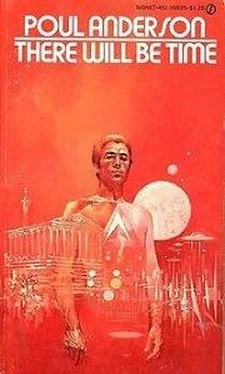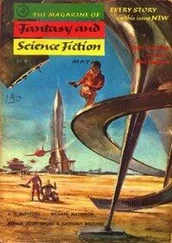Poul Anderson - There Will Be Time
Здесь есть возможность читать онлайн «Poul Anderson - There Will Be Time» весь текст электронной книги совершенно бесплатно (целиком полную версию без сокращений). В некоторых случаях можно слушать аудио, скачать через торрент в формате fb2 и присутствует краткое содержание. Год выпуска: 1972, Издательство: Doubleday, Жанр: Фантастика и фэнтези, на английском языке. Описание произведения, (предисловие) а так же отзывы посетителей доступны на портале библиотеки ЛибКат.
- Название:There Will Be Time
- Автор:
- Издательство:Doubleday
- Жанр:
- Год:1972
- ISBN:нет данных
- Рейтинг книги:5 / 5. Голосов: 1
-
Избранное:Добавить в избранное
- Отзывы:
-
Ваша оценка:
- 100
- 1
- 2
- 3
- 4
- 5
There Will Be Time: краткое содержание, описание и аннотация
Предлагаем к чтению аннотацию, описание, краткое содержание или предисловие (зависит от того, что написал сам автор книги «There Will Be Time»). Если вы не нашли необходимую информацию о книге — напишите в комментариях, мы постараемся отыскать её.
Nominated for Hugo Award for Best Novel in 1973.
There Will Be Time — читать онлайн бесплатно полную книгу (весь текст) целиком
Ниже представлен текст книги, разбитый по страницам. Система сохранения места последней прочитанной страницы, позволяет с удобством читать онлайн бесплатно книгу «There Will Be Time», без необходимости каждый раз заново искать на чём Вы остановились. Поставьте закладку, и сможете в любой момент перейти на страницу, на которой закончили чтение.
Интервал:
Закладка:
His door was closed, the shutters were bolted, wan lamplight shone through cracks.
He knocked, expecting the current maid — Eulalia, was that her name? — to lift the latch and grumble him in. She’d be surprised to see him back this soon, but the hell with her.
Hinges creaked. Gloom gaped beyond. A man in Byzantine robe and beard occupied the doorway. The shotgun in his grasp bulked monstrous. “Do not move, Havig,” he said in English. “Do not try to escape. Remember, we hold the woman.”
Save for an ikon of the Virgin, their bedroom was decorated in gaiety. Seen by what light trickled in a glazed window, the painted flowers and beasts jeered. It was wrong that a lamb should gambol above Xenia where she lay. She was so small and thin in her nightgown. Skin, drawn tight across the frail bones, was like new-fallen snow dappled with blood. Her mouth was dry, cracked, and gummed. Only the hair, tumbling loose over her bosom, and the huge frightened eyes had luster.
The man in East Roman guise, whom Havig did not know, held his left arm in a practiced grip. Juan Mendoza had the right, and smirked each time he put backward pressure on the elbow joint. He was dressed in Western style, as was Waclaw Krasicki, who stood at the bedside.
“Where are the servants?” Havig asked mechanically.
“We shot them,” Mendoza said.
“What—”
“They didn’t recognize a gun, so that wouldn’t scare them. We couldn’t let a squawk warn you. Shut up.”
The shock of knowing they were dead, the hope that the children had been spared and that an orphanage might take them in, struck Havig dully, like a blow on flesh injected with painkiller. Xenia’s coughing tore him too much.
“Hauk,” she croaked, “no, Jon, Jon—” Her hands lifted toward him, strengthless, and his were caught immobile.
Krasicki’s broad visage had noticeably aged. Years of his lifespan must have passed, uptime, downtime, everywhen an outrage was to be engineered. He said in frigid satisfaction:
“You may be interested to know what a lot of work went on for how long, tracking you down. You’ve cost us, Havig.”
“Why … did … you bother?” the prisoner got out.
“You did not imagine we could leave you alone, did you? Not just that you killed men of ours. You’re not an ignorant lout, you’re smart and therefore dangerous. I’ve been giving this job my personal attention.”
Havig thought drearily: What an overestimate of me.
“We must know what you’ve been doing,” Krasicki continued. “Take my advice and cooperate.”
“How did you — ?”
“Plenty of detective work. We reasoned, if a Greek family was worth to you what you did, you’d keep in touch with them. You covered your trail well, I admit. But given our limited personnel, and the problems in working here, and everything else we had to do throughout history — you needn’t feel too smug about your five-year run. Naturally, when we did close in, we chose this moment for catching you. The whole neighborhood knows your wife is seriously ill. We waited till you went out, expecting you’d soon be back.” Krasicki glanced at Xenia. “And cooperative, no?”
She shuddered and barked, as an abandoned dog had barked while her father was slain. Blood colored the mucus she cast up.
“Christ!” Havig screamed. “Let me go! Let me treat her!”
“Who are they, Jon?” she pleaded. “What do they want? Where is your saint?”
“Besides,” Mendoza said, “Pat Moriarty was a friend of mine.” He applied renewed pressure, barely short of fracturing.
Through the ragged darknesses which pain rolled across him, Havig heard Krasicki: “If you behave, if you come along with us, not making trouble, okay, we’ll leave her in peace. I’ll even give her a shot from that kit I guess you went to fetch.”
“That … isn’t … enough … Please, please—”
“It’s as much as she’ll get. I tell you, we’ve already wasted whole man-years on your account. Don’t make us waste more, and take added risks. Look, would you rather we broke her arms?”
Havig sagged and wept.
Krasicki kept his promise, but his insertion of the needle was clumsy and Xenia shrieked. “It’s well, it’s well, my darling, everything’s well, the saints watch over you,” Havig cried from the far side of a chasm which roared. To Krasicki: “Listen, let me say good-by to her, you’ve got to, I’ll do anything you ask if you let me say good-by.”
Krasicki shrugged. “Okay, if you’re quick.”
Mendoza and the other man kept their hold on Havig while he stooped above his girl. “I love you,” he told her, not knowing if she really heard him through the fever and terror. The mummy lips that his touched were not those he remembered.
“All right,” Krasicki said, “let’s go.”
Uptime bound, Havig lost awareness of the men on either side of him. They had substance to his senses, like his own body, but only the shadow-flickers in the room were real. He saw her abandoned, reaching and crying; he saw her become still; he saw someone who must have grown worried and broken down the door step in, days later; he saw confusion, and then the chamber empty, and then strangers in it.
So he might have resisted, willed himself to stay in normal time at their first stop for air, an inertness which his captors could not move. But there are ways to erode any will. Better not arrive at the Eyrie crippled alike in body and spirit, ready for whatever might occur to Caleb Wallis. Better keep the capability of revenge.
That thought was vague. The whole of him was drowned in her death. He scarcely noticed how the shadows shifted — the house which had been hers and his torn down for a larger, which caught fire when the Turks took Pera, and was succeeded by building after building filled with faces and faces and faces, until the final incandescence and the drifting radioactive ash — nor their halt among ruins, their flight across the ocean, their further journey to that future where the Sachem waited. In him was nothing except Xenia, who saw him vanish and lay back to die alone, unshriven.
While summer blanketed the Eyrie in heat and brazen light, the tower room where Havig was confined stored cool dimness in its bricks. It was bare save for a washstand, a toilet, a mattress, and two straight chairs. A single window gave upon the castle, the countryside, the peasants at labor for their masters. When you had looked out into yonder sunshine, you were blind for a while.
A wire rope, welded at the ends, stretched five feet from a ring locked around his ankle to a staple in the wall. That sufficed. A time traveler bore along whatever was in direct contact with him, such as clothing. In effect, Havig would have had to carry away the entire keep. He did not try.
“Sit down, do sit down,” Caleb Wallis urged.
He had planted his broad bottom in one of the chairs, beyond reach of his prisoner. Black, epauletted uniform, neatly combed gingery whiskers, bare pate were an assertion of lordship over Havig’s grimed archaic clothes, stubbly jaws, bloodshot and murk-encircled eyes.
Wallis waved his cigar. “I’m not necessarily mad at you,” he said. “In fact, I kind of admire your energy, your cleverness. I’d like to recall them to my side. That’s how come I ordered the boys to let you rest before this interview. I hope the chow was good? Do sit down.”
Havig obeyed. He had not ceased to feel numb. During the night he had dreamed about Xenia. They were bound somewhere on a great trimaran whose sails turned into wings and lifted them up among stars.
“We’re private here,” Wallis said. An escort waited beyond the door, which stood thick and shut. “You can talk free.”
“Supposing I don’t?” Havig replied.
Читать дальшеИнтервал:
Закладка:
Похожие книги на «There Will Be Time»
Представляем Вашему вниманию похожие книги на «There Will Be Time» списком для выбора. Мы отобрали схожую по названию и смыслу литературу в надежде предоставить читателям больше вариантов отыскать новые, интересные, ещё непрочитанные произведения.
Обсуждение, отзывы о книге «There Will Be Time» и просто собственные мнения читателей. Оставьте ваши комментарии, напишите, что Вы думаете о произведении, его смысле или главных героях. Укажите что конкретно понравилось, а что нет, и почему Вы так считаете.












